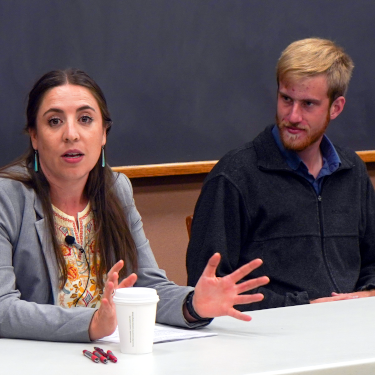- Home
-
About
 Fidelity & Excellence
Fidelity & ExcellenceThomas Aquinas College is unique among American colleges and universities, offering a faithfully Catholic education comprised entirely of the Great Books and classroom discussions.
-
A Liberating Education
 Truth Matters
Truth MattersTruth, and nothing less, sets men free; and because truth is both natural and supernatural, the College’s curriculum aims at both natural and divine wisdom.
-
A Catholic Life
 Under the Light of Faith
Under the Light of FaithThe intellectual tradition and moral teachings of the Catholic Church infuse the whole life of Thomas Aquinas College, illuminating the curriculum and the community alike.
-
Admission & Aid
 Is TAC Right for You?
Is TAC Right for You?Do you enjoy grappling with complex questions? Are you willing to engage in discussions about difficult concepts, with the truth as your ultimate goal?
-
Students & Parents
 Mind, Body & Spirit
Mind, Body & SpiritThere is always something to do at TAC — something worthwhile, something fulfilling, and something geared toward ever-greater spiritual and intellectual growth.
-
Alumni & Careers
 What Can You Do with a Liberal Education?
What Can You Do with a Liberal Education?Nothing speaks more to the versatility of the College’s academic program than the good that our alumni are doing throughout the Church and the world.
- Search
- Giving
Alumna Psychologist Encourages Students to Enter Field
“At the time my education felt like it would be an obstacle,” alumna psychologist Dr. Helena Orellana (’11) admitted to a group of Thomas Aquinas College students at a career talk last week. “But the formation I received at TAC was exactly what I needed to pursue a doctorate in psychology. Not only that, it prepared me for work as a clinician and later as a professor.”

Addressing a room full of students on the California campus, Dr. Orellana spoke on the subject, “Becoming a Classically Trained Psychologist: How a Liberal Arts Education Prepares You to be a Source of Hope, Healing, and Compassion.” A member of the TAC Class of 2011, Dr. Orellana holds a doctorate in psychology from Divine Mercy University, where she now serves as the assistant director of clinical training and an assistant professor.
“The liberal arts fostered in me a deep appreciation for humanity and the human person,” said Dr. Orellana. “To enter into the depths of human suffering as a source of true hope, you must hold firmly to a clear vision of human nature ... you must know the good, beautiful, and true. As well, you must employ clinical theory and techniques that are consistent with this nature. I believe the liberal arts and TAC’s formation, especially, provide clinicians a strong foundation to work toward the healing of patients.”
As part of the College’s integrated curriculum, students read landmark works of psychology, including Freud and Jung, which, Dr. Orellana said, equipped her well for graduate school. “Having done that, I felt like I had already done parts of the curriculum when I arrived on campus,” she said. “The pursuit of those works and other abstract ideas helped me in the classroom as we explored psychology.”
Students at Thomas Aquinas College learn collaboratively through the Discussion Method, oftentimes recalling past discussions with their classmates and drawing upon myriad experiences to make connections between different works. “You do much of the same in therapy. Not only is the Socratic method of questioning a therapeutic method, but a long-term memory of previous discussions is essential,” said Dr. Orellana. “As a professor, it’s the TAC grads and liberal arts students who I see do that the best.”
As such, she strongly encouraged TAC students with an interest in psychology to pursue it as a profession. “I think it’s important that we have more psychologists working with a deep appreciation for philosophy and theology. They can advocate for the reality of the human person as the landscape shifts as well as help expand the field and heal countless people,” said Dr. Orellana. “There’s a deep need for clinicians with an understanding of the human person and a readiness to meet the suffering of recent years.”


